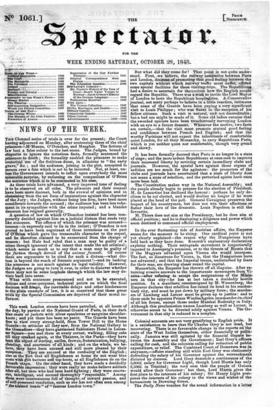NEWS OF THE WEEK.
THE Clonmel series of trials is over for the present; the Court having adjourned on Monday, after sentencing three of the chief prisoners—M‘Manus, O'Donohoe, and Meagher. The fictions of law lent a false colour to the last scene. The Judges, bound by etiquette to ignore the notorious facts, formally sentenced the prisoners to death ; the formality enabled the prisoners to make oratorical use of the fictitious doom, in allusions to "the early grave," &c.; and the audience, joining in the plot, conspired to mourn over a fate which is not to be incurred. Not, at least, un- less the Government intends to inflict upon everybody the most miserable surprise, by enforcing on the companions of O'Brien the sentence which is to be commuted in his case.
As these trials have advanced, a very improved tone of feeling is to be observed on all sides. The prisoners and their counsel have been more discreet, both in the avowal of opinions and in abstaining from the set form of imputations against the character of the Jury ; the Judges, without being less firm, have been more considerate towards the accused ; the audience has been less vehe- ment in its sympathies with the crime imputed ; and a blander decorum has reigned generally.
A question of law on which O'Donohoe insisted has been tem- porarily decided against him on a judicial dictum that reads very like nonsense. The offence of which the prisoner was accused- treason—is expressly said to lie in the intent ; O'Donohoe is not proved to have been cognizant of those intentions on the part of O'Brien which gave the treasonable character to the sequel, and he therefore claimed to be exonerated from the charge of treason: but Hale had ruled that a man may be guilty of a crime though ignorant of the intent that made the act criminal; which seems as much as to say that a man may be guilty of the ihrtunt though devoid of the animus furandi. Of course there are arguments to be cited for such a dictum—what dic- tum is beyond the reach of forensic argument ?—and its looking like nonsense is not much against its legal validity. However, the Judges are going to turn it over, in order to discover whether there may not be some loophole through which the law may de- viate back into sense.
What with sentences pronounced and not to be executed, fictions and cross-purposes, technical points on which the filial decision will hinge, the inevitable delays and other hinderances to the plain example of law, it is so contrived that these great trials by the Special Commission are deprived of their moral in- fluence.


























